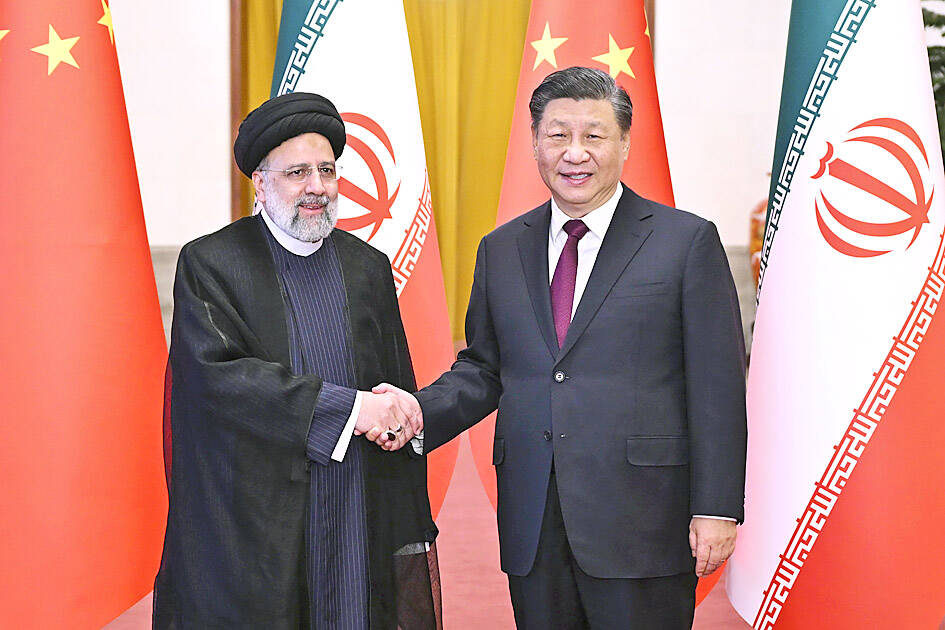Chinese President Xi Jinping (習近平) on Tuesday expressed support for Iran during a visit by Iranian President Ebrahim Raisi as Tehran tries to expand relations with Beijing and Moscow to offset Western sanctions over its nuclear development.
The official Chinese account of Xi’s meeting with Raisi gave no indication of whether they discussed Russia’s war in Ukraine.
Tehran supplied military drones to Russian President Vladimir Putin’s government, but says they were delivered before the war began.

Photo: AP
Xi expressed support for Raisi’s government in language Beijing uses to criticize Washington’s domination of global affairs.
“China supports Iran in safeguarding national sovereignty” and “resisting unilateralism and bullying,” Xi said in a statement carried by Chinese state TV on its Web site.
Xi and Raisi attended the signing of 20 cooperation agreements, including on trade and tourism, the Chinese government said.
Those add to a 25-year strategy agreement signed in 2021 to cooperate in developing oil, industry and other fields.
Iran has for years struggled under trade and financial sanctions imposed by Washington and other Western governments over what they say is Tehran’s efforts to develop nuclear weapons, an accusation the Iranian government denies.
US Department of State spokesman Ned Price urged the People’s Republic of China (PRC) to influence Iran and lower potential threats in the region, saying that “would be in both of our interests.”
“The PRC has a role to play in very clearly signaling to Iran that its destabilizing activities — that its brinksmanship — is not going to be rewarded, it’s not going to be countenanced. It is not something that the international community is prepared to sit idly by and watch,” Price told reporters in Washington.
Xi said that Beijing “opposes external forces interfering in Iran’s internal affairs and undermining Iran’s security and stability,” the government statement said.
It said Xi promised to “work together on issues involving each other’s core interests,” but gave no details.
Raisi’s government did not immediately release details of the meeting, but the president called the two governments “friends in difficult situations” in a commentary published on Monday by the People’s Daily.
Chinese Ministry of Foreign Affairs spokesman Wang Wenbin (汪文斌), asked whether Beijing was concerned that getting closer to Iran might complicate US-Chinese ties, said their “friend relations” contribute to “promotion of peace and stability in the Middle East.”
“Our relations do not target any third parties,” Wang said.

The Taiwanese passport ranked 33rd in a global listing of passports by convenience this month, rising three places from last month’s ranking, but matching its position in January last year. The Henley Passport Index, an international ranking of passports by the number of designations its holder can travel to without a visa, showed that the Taiwan passport enables holders to travel to 139 countries and territories without a visa. Singapore’s passport was ranked the most powerful with visa-free access to 192 destinations out of 227, according to the index published on Tuesday by UK-based migration investment consultancy firm Henley and Partners. Japan’s and

NATIONAL SECURITY THREAT: An official said that Guan Guan’s comments had gone beyond the threshold of free speech, as she advocated for the destruction of the ROC China-born media influencer Guan Guan’s (關關) residency permit has been revoked for repeatedly posting pro-China content that threatens national security, the National Immigration Agency said yesterday. Guan Guan has said many controversial things in her videos posted to Douyin (抖音), including “the red flag will soon be painted all over Taiwan” and “Taiwan is an inseparable part of China,” while expressing hope for expedited “reunification.” The agency received multiple reports alleging that Guan Guan had advocated for armed reunification last year. After investigating, the agency last month issued a notice requiring her to appear and account for her actions. Guan Guan appeared as required,

Japan and the Philippines yesterday signed a defense pact that would allow the tax-free provision of ammunition, fuel, food and other necessities when their forces stage joint training to boost deterrence against China’s growing aggression in the region and to bolster their preparation for natural disasters. Japan has faced increasing political, trade and security tensions with China, which was angered by Japanese Prime Minister Sanae Takaichi’s remark that a Chinese attack on Taiwan would be a survival-threatening situation for Japan, triggering a military response. Japan and the Philippines have also had separate territorial conflicts with Beijing in the East and South China

A strong cold air mass is expected to arrive tonight, bringing a change in weather and a drop in temperature, the Central Weather Administration (CWA) said. The coldest time would be early on Thursday morning, with temperatures in some areas dipping as low as 8°C, it said. Daytime highs yesterday were 22°C to 24°C in northern and eastern Taiwan, and about 25°C to 28°C in the central and southern regions, it said. However, nighttime lows would dip to about 15°C to 16°C in central and northern Taiwan as well as the northeast, and 17°C to 19°C elsewhere, it said. Tropical Storm Nokaen, currently